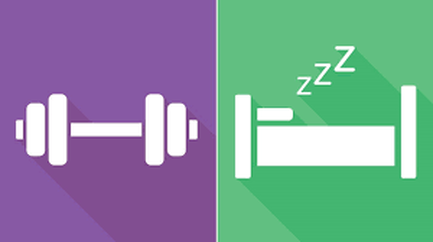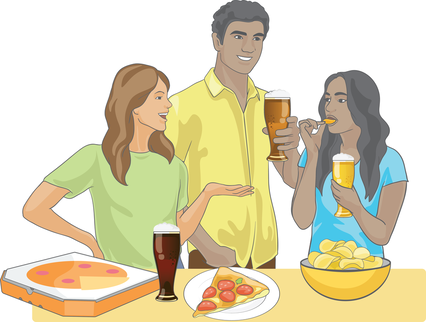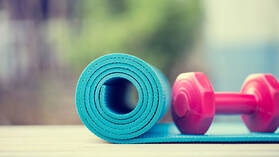 Most people don’t want to make weight loss harder. Or weight gain easier. Yet when you don’t get enough sleep, there’s a good chance that’s exactly what you’re doing. What’s the connection? If you sleep 5 or 6 hours when you really need 7 or 8, you keep your body in a chronically sleep-deprived state. This messes with your body’s ability to regulate several key hormones that: - Increase your hunger - Make it harder for you to feel satisfied and/or full - Make food seem even more desirable and rewarding End result: You can’t keep yourself away from the chips. By not getting enough sleep, you’re hungrier and you crave sweets more than you otherwise would. You’re also tired, so you exercise and move less. And more awake time means more time to raid the kitchen. Bottom line: Research shows sleep-deprived people tend to eat about 300 more daily calories than people who get enough sleep. (Plus, they just feel worse.) What can you do? Sleep loss usually happens as a result of one of two issues: 1) You’re not prioritizing sleep. (And instead, stay up late working, scrolling on your phone, or watching TV) 2) You want to sleep, but toss and turn all night. The first issue often requires a grown-up talk with yourself: Clarify why sleep is important to your health and longer term goals—even if finding out what happens next in your favorite TV show feels *urgent* in the moment. The second issue can feel more frustrating. After all, you can’t just decide or force yourself to sleep when your brain keeps buzzing. However, you can control your environment and your routines, and make small changes to them so that good sleep is more likely. - Turn off electronics. - De-stress. - Take a bath or shower. - Create a relaxing sleep area. - Set your room to an appropriate temperature. - Make the room as dark as possible. If you’re having trouble regulating your appetite (and your snack attacks) consider making some changes to support sleep. With consistent, improved rest, you might find that your nutrition goals are suddenly a whole lot easier to reach.
0 Comments
 Eat Junk Food--and Improve Your Health We all know a diet filled with junk food can lead to a lot of problems: from weight gain to increased risk of disease to feelings of shame. But here’s something most people miss: Eating junk food can also have some health benefits—assuming you consume it in moderation and intentionally. By intentionally, we mean… You choose to eat the food… On purpose (not just because it’s there) With joy and contentment (rather than guilt) In an amount that aligns with your overall health goals After weighing and accepting the tradeoffs Do all that, and the occasional processed food treat can help you connect with friends, and boost your experience of freedom and pleasure in your diet. The result: Even if that ice cream indulgence isn’t directly helping your physical health, it might be helping you to feel healthier overall—and better able to sustain an otherwise highly nutritious diet. Healthy diets aren’t “perfect” diets. If most of your meals (say, 70 to 80 percent of them) are made up of whole or minimally-processed foods, that really is good enough. Meaning: There is room for your favorite indulgences in your diet. We have learned that most people are actually more successful when they allow themselves to eat their favorite foods regularly and intentionally. This is partly because too much restriction can backfire (and then you find yourself crying into an empty bag of cookies). Nutrition is just a part of your overall health. Equally important: Your relationships, emotional wellbeing, and sense of meaning, purpose, and autonomy. If a weekly pizza night with your family contributes to that, well then, pizza is part of a healthy life. Work Hard Play Hard!  In your 20s? Listen up and learn why getting fit now can make your life a whole lot better.A perk to being lean, fit, and muscular in your 20s is that it certainly won’t hurt your odds in the romance department. But believe it or not, there are more important reasons to hit the gym and get in shape while you’re young. You’ll Develop Good Habits Learning how to use food for fuel and adopting a strict exercise early on can help keep your body working at full capacity. In the decades that follow, those types of healthy practices can help you stave off otherwise avoidable ailments like high blood pressure and heart disease. Forming good habits when you’re in your 20s will be easier than if you’re trying to develop them when you’re in your 30s, 40s, or 50s. At that point you may have to change your whole life around to implement them. Another reason to adopt healthy habits early on is so you can apply them to other areas of your life. That’s what Arnold Schwarzenegger did. The tools he learned in the gym helped build his movie career, and eventually got him into government. You’ll Make a Lasting Impression Hiring managers and potential employers notice your appearance. So when you dress, look, and carry yourself like a disheveled blockhead, you’ll be pegged as a sloppy worker. Whether you’re in a suit or plumber’s uniform, being lean, fit, and in shape gives off the impression that you’re disciplined, hard-working, and intelligent. If you’re in your 20s and just getting out of school, it helps your career by telling people that you have the ability to get the job done. You’ll Be More Productive Research published in the journal Physiology & Behavior noted that eating sugary and high-fat processed foods led to subjects feeling tired and lazy. And a separate study published in the journal Population Health Management linked unhealthy habits outside of work with having a direct impact on productivity loss while on the job. When you’re trying to get ahead, having the energy of a sloth won’t get you there. A healthy diet, strict exercise routine, and proper sleep hygiene are a crucial trio in maintaining energy and focus. You’ll Learn to Fail The continuous challenge to lift more weight, blast out one more rep, or shave a fraction of a second off of your mile time will inevitably include numerous failures in route to achieving your goal. And that is what sets the stage for successes later on. The first thing a bodybuilder learns is that failure is goods. If I fail, I grow. And that’s the opposite lesson you’ll learn in the business world. But the thing to remember is that the most successful people fail. They don’t cry over it, but it’s part of the journey. If you’re not failing, you’re not doing anything worthwhile. So take that failure and success you’ve experienced in the gym and bring it into other parts of your life. You’ll Be More Confident Exercising and eating clean will put a pep in your step and provide you with the confidence to accomplish goals. Typically, psychology will follow physiology. If you’re not feeling confident, start moving your body in a confident way. And when you’re fit with strong muscles, you move with confidence. Again, it’s about taking the lessons learned inside of the gym and using them in other areas of their lives. You’ll Learn to Set Goals Unless you have freakish genetics, you’re going to have to work your ass off to put up big numbers on the squat or bench press. To do that safely and injury-free, you need to set smaller, attainable goals. Those structured goals that you use in the gym where you’re doing something on a regular basis to get a predictable result can be a training routine for life. Find habits that are working for others, whether it’s a schedule or training routine, and use them yourself. It’s a very effective way to achieve success. You’ll Find it Easier to Stay in Shape Staying in shape is easier than getting into shape. And not being in shape opens you up to having other stuff pile on like type 2 diabetes, or extremes like cancer and heart disease. When you tack on what life throws at you — relationship woes, money problems, family commitments — starting from scratch when you’re older becomes more even more difficult. Taking care of your body when you’re young also keeps estrogen levels in check. Some guys in their 30s and 40s are pair-shaped and have breasts because their estrogen levels are too high. A bodybuilding lifestyle keeps your hormones and body fat under control.  Most of us are familiar with the most common barrier to a regular physical activity routine -- the lack of time. Work, family obligations and other realities of daily life often get in the way of our best intentions to be more active. There are many additional barriers that vary by the person and life circumstance. If you're committed to a physical activity program and setting goals for yourself, it’s helpful to first identify your personal barriers. By troubleshooting and developing tactics in advance, you’ll have better success overcoming them. Here are some of the more common barriers and solutions for overcoming them: Barrier: Lack of time Solutions: Monitor your activities for one week and identify at least three, 30-minute slots you could use for physical activity. Select activities that you can fit into your home or work routine so you’re not wasting time on transportation to another venue to accomplish them. Walking in your neighborhood, climbing stairs at your office or exercising while you watch TV are all good options. Barrier: Friends and family don’t share your interest in physical activity Solutions: Explain your fitness and/or health improvement goals to friends and family and ask for their support. Invite friends to participate in physical activity with you. Join a fitness center to find people with similar goals to offer support. Barrier: Lack of motivation and/or energy Solutions: Plan ahead. Schedule physical activity for specific times/days and “check” it off your list or calendar each time you complete it. Determine what time of day you feel more energetic and try to fit activity into that time frame. Join an exercise group or class and seek others in the group to help motivate you and keep you accountable to attending. Barrier: Lack of resources/equipment Solutions: Select activities that require minimal facilities or equipment, such as walking, jogging, jumping rope or calisthenics. Identify inexpensive, convenient resources in your community, such as parks and recreation programs, worksite wellness groups, walking clubs, etc. Barrier: Family caregiving obligations Solutions: Exercise with your kids -- go for a walk together, play tag or other running games, get an aerobic dance or exercise tape for kids. You can spend time together, occupy the kids and ensure they're getting the daily physical activity they need to stay healthy. If you have a specific class you like to attend, try alternating babysitting time with a neighbor. Barrier: Frequent work or leisure travel Solutions: Join a fitness center and ask about reciprocal memberships that allow access to facilities in other cities or virtual options. Pack a jump rope and resistance bands in your luggage. Book hotels that have a pool and/or fitness rooms.  Chances are you already know that eating too much sugar isn’t good for you. Yet you’re probably still overdoing it. Americans average about 270 calories of sugar each day, that’s about 17 teaspoons a day, compared to the recommended limits of about 12 teaspoon per day or 200 calories. Sugary drinks, candy, baked goods, and sweetened dairy are the main sources of added sugar. But even savory foods, like breads, tomato sauce, and protein bars, can have sugar, making it all too easy to end up with a surplus of the sweet stuff. To complicate it further, added sugars can be hard to spot on nutrition labels since they can be listed under a number of names, such as corn syrup, agave nectar, palm sugar, cane juice, or sucrose. No matter what it’s called, sugar is sugar, and in excess, it can negatively affect your body in many ways. Here’s a closer look at how sugar can mess with your health, from head to toe. Your Brain Eating sugar gives your brain a huge surge of a feel-good chemical called dopamine. That explains why you’re more likely to crave a candy bar at 3 p.m. than an apple or a carrot. Because whole foods like fruits and veggies don’t cause the brain to release as much dopamine, your brain starts to need more and more sugar to get that same feeling of pleasure. This causes those “gotta-have-it” feelings for your after-dinner ice cream that are so hard to tame. Your Mood The occasional candy or cookie can give you a quick burst of energy (or “sugar high”) by raising your blood sugar levels fast. When your levels drop as your cells absorb the sugar, you may feel jittery and anxious (a.k.a. the dreaded “sugar crash”). But if you’re reaching into the candy jar too often, sugar starts to have an effect on your mood beyond that 3 p.m. slump: Studies have linked a high sugar intake to a greater risk of depression in adults. Your Teeth You probably rolled your eyes at age 12, but your parents were right: candy can rot your teeth. Bacteria that cause cavities love to eat sugar lingering in your mouth after you eat something sweet. Your Joints If you have joint pain, here’s more reason to lay off the candy: Eating lots of sweets has been shown to worsen joint pain because of the inflammation they cause in the body. Plus, studies show that eating or drinking sugar can raise your risk of developing rheumatoid arthritis. Your Skin Another side effect of inflammation is that it may make your skin age faster. Excess sugar attaches to proteins in your bloodstream and creates harmful molecules called “AGEs,” or advanced glycation end products. These molecules do exactly what they sound like they do: age your skin. They have been shown to damage collagen and elastin in your skin -- protein fibers that keep your skin firm and youthful. The result? Wrinkles and saggy skin. Your Liver An abundance of added sugar likely contains fructose or high fructose corn syrup. Fructose is process in the liver and in large amounts can damage the liver. When fructose is broken down in the liver it is transformed into fat. In turn this causes:
Your Heart When you eat or drink too much sugar, the extra insulin in your bloodstream can affect your arteries all over your body. It causes their walls to get inflamed, grow thicker than normal and more stiff, this stresses your heart and damages it over time. This can lead to heart disease, like heart failure, heart attacks, and strokes. Research also suggests that eating less sugar can help lower blood pressure, a major risk factor for heart disease. Plus, people who eat a lot of added sugar (where at least 25% of their calories comes from added sugar) are twice as likely to die of heart disease as those whose diets include less than 10% of total calories from added sugar. Your Pancreas When you eat, your pancreas pumps out insulin. But if you’re eating way too much sugar and your body stops responding properly to insulin, your pancreas starts pumping out even more insulin. Eventually, your overworked pancreas will break down and your blood sugar levels will rise, setting you up for type 2 diabetes and heart disease. Your Kidneys If you have diabetes, too much sugar can lead to kidney damage. The kidneys play an important role in filtering your blood. Once blood sugar levels reach a certain amount, the kidneys start to release excess sugar into your urine. If left uncontrolled, diabetes can damage the kidneys, which prevents them from doing their job in filtering out waste in your blood. This can lead to kidney failure. Your Body Weight This probably isn’t news to you, but the more sugar you eat, the more you’ll weigh. Research shows that people who drink sugar-sweetened beverages tend to weigh more -- and be at higher risk for type 2 diabetes -- than those who don’t. One study even found that people who added more sugar to their diet gained about 1.7 pounds in less than 2 months. Excess amounts of sugar can inflame fat cells causing them to release chemicals that increase weight. Your Sexual Health If you're a man, you may want to skip the dessert on date night. Sugar may impact the chain of events needed for an erection. It affects your circulatory system, which controls the blood flow throughout your body and needs to be working properly to get and keep an erection. |
AuthorBrian Lowe Archives
January 2024
Categories |

 RSS Feed
RSS Feed